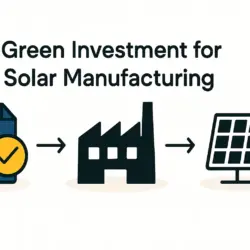New Zealand’s government is boosting community solar projects by providing $28.1 million in loans from the Green Investment Fund. These loans will support the development of community solar initiatives, including rooftop solar installations and solar farms.
Government’s Vision for Community Solar with NZ community solar loans
The government aims to make solar energy more accessible and affordable, allowing more people to participate in and benefit from solar power. Energy Minister Megan Woods emphasized the importance of enabling more New Zealanders to join the solar revolution. She highlighted that this funding will help develop community solar projects, ultimately making solar energy more affordable and accessible.
“By making solar more affordable and accessible, more people will be able to join in the solar revolution,” she said.
This initiative resonates with the broader goal of regional development, aiming to distribute the benefits of renewable energy across different areas of New Zealand. This approach is similar to efforts in Germany, where regional incentives and funding programs play a crucial role in expanding renewable energy infrastructure.
Partnership with Community Energy Network for NZ community solar loans
The loans will be managed by the Community Energy Network, an organization that will oversee the distribution of funds to various community solar projects. This partnership is a key component of the government’s strategy to promote renewable energy at the community level.
The loans will be used to develop a range of solar projects, including rooftop solar installations for households and businesses, as well as larger solar farms. These projects are expected to generate significant amounts of clean energy, reducing reliance on fossil fuels and lowering greenhouse gas emissions.
The government’s investment in community solar is part of its broader efforts to transition New Zealand to a low-carbon economy. By supporting solar projects at the community level, the government aims to foster local participation in renewable energy initiatives. This approach not only promotes sustainability but also helps create jobs and stimulate economic growth. The initiatives are supported by the Energy portfolio.
Benefits of Community Solar Projects with NZ community solar loans
Community solar projects offer numerous benefits. They allow individuals and businesses to participate in solar energy projects without having to install solar panels on their own properties. This is particularly beneficial for renters and those living in multi-unit buildings who may not have the option to install solar panels themselves.
For German residents, this model is particularly relevant. Many apartment dwellers or those in historic buildings face restrictions on installing private solar panels. Community solar offers a way to access renewable energy benefits without needing individual installations. Similarly, homeowners can also benefit. Rewiring Aotearoa has shown that rooftop solar is the cheapest delivered electricity available to New Zealand households.
Additionally, community solar projects often provide cost savings to participants. By pooling resources and sharing the costs of solar installations, participants can benefit from lower energy bills. These projects also contribute to the overall resilience of the energy grid by diversifying the sources of energy supply.
The New Zealand government’s support for community solar projects is a significant step toward achieving its renewable energy goals. By providing $28.1 million in loans, the government is making it easier for communities to develop solar projects that will benefit both the environment and the economy. The recent tax changes set to benefit residential solar and battery systems will likely further boost solar energy adoption.



